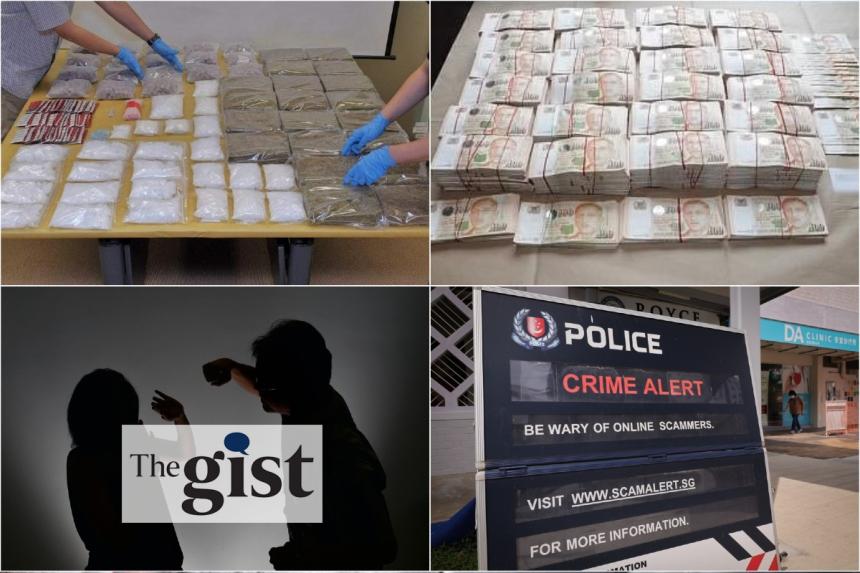SINGAPORE - New laws to tackle scams, drug abuse and family violence, and a promise to review the financial system in the wake of a $2.8 billion money laundering probe. These were some of the top news events of the year. Here is a snapshot of five of them.
1. New classification for psychoactive drugs amid concerns over their prevalence

Amendments to Singapore’s drug laws were passed in Parliament in March, to define any substance that is abused for a high as a psychoactive substance.
This excludes substances such as alcohol, caffeine, tobacco, food additives and health products.
Minister of State for Home Affairs Muhammad Faishal Ibrahim said in Parliament that drug suppliers are known to tailor the molecular structure of new psychoactive substances according to what is not yet controlled through legislation.
With the changes to the Misuse of Drugs Act and the Constitution, a new legislative framework will be introduced for psychoactive substances, by criminalising the trafficking, manufacture, import, export, possession and consumption of such substances.
Under the new laws, substances will be controlled based on their capacity to produce a psychoactive effect, rather than their chemical structure.
Why it matters

Before the amendments, the authorities could not prosecute abusers of a new psychoactive substance until the substance was listed in the First Schedule. This process could take up to a year.
Associate Professor Faishal said this disadvantaged the authorities, who were constantly made to play catch-up with the syndicates.
He also noted that the drug threat globally and locally is rising, with the proliferation of new psychoactive substances and exceptionally large drug seizures in Singapore in recent years.
2. New laws governing money mules as scam scourge continues

Tougher laws aimed at clamping down on money mules and those who sell their bank or Singpass accounts were passed in May.
The amendments to the Corruption, Drug Trafficking and Other Serious Crimes (Confiscation of Benefits) Act and the Computer Misuse Act will make it easier to prosecute those who sell their payment and Singpass accounts.
The changes to the laws will introduce the new offences of rash and negligent money laundering, and disclosing or dealing in Singpass credentials for criminal activities.
The new laws will also make it an offence for anyone to disclose his Singpass credentials while knowing, or suspecting, that these will be used to commit an offence.
Why it matters
The scam situation continues to persist in Singapore, with scam victims losing $334.5 million from January to June 2023, according to figures from the police.
Between 2020 and 2022, the police investigated more than 19,000 money mules, but fewer than 250 were prosecuted due to gaps in the law.
Second Minister for Home Affairs Josephine Teo said in Parliament that while there were around 120 money mules suspected of helping scammers in the phishing scams targeting OCBC Bank customers from December 2021 to January 2022, only nine could be charged because of limitations in the law.
She added that the intention is not to penalise victims through the new offences, and that the authorities will consider the numerous factors in each case, and will act judiciously.
3. Money laundering probe

On Aug 15, more than 400 officers, led by the Commercial Affairs Department, raided properties in locations including Tanglin, Bukit Timah, Orchard Road, Sentosa and River Valley.
The foreigners arrested, all originally from China, were charged with various offences, including money laundering, forgery and resisting arrest.
The authorities seized or issued prohibition of disposal orders on assets that included bungalows in Sentosa Cove, luxury cars, watches, handbags and Bearbrick ornaments. It is one of the world’s largest money laundering cases.
The 10 accused have remained in remand since their arrest, with the courts denying applications by their lawyers for them to be granted bail.
Why it matters
While the nine men and one woman are still undergoing court proceedings, the watershed case has already impacted a variety of sectors in Singapore.
In October, it was announced that an inter-ministerial committee would be set up to review Singapore’s financial system and strengthen its anti-money laundering regime.
It was also reported that month that banks in Singapore were taking longer than usual to perform due diligence on clients and closing accounts in some cases, as procedures tightened.
Banks such as OCBC, Citigroup and UOB were said to be demanding more documents than usual in some cases to verify sources of wealth.
The charity sector has also not been spared.

Investigations showed that some of the accused had donated money to various charitable organisations and social service agencies in the past three years.
After the revelation, the Commissioner of Charities urged charities to review their donor records from as far back as January 2019, to see if persons of interest linked to the money laundering case had donated money to them.
4. New laws rolled out to combat family violence

Amendments to the Women’s Charter were passed in July to better protect survivors of family violence, as well as enhance the rehabilitation and accountability of perpetrators.
With the changes, the Government will have more power to intervene in family violence cases through granting powers to “protectors”, who will be allowed to obtain information on whether someone is experiencing, or at risk of, family violence.
These “protectors” – people with suitable qualifications and experience, appointed by the Ministry of Social and Family Development’s Director-General of Social Welfare – can enter a home to make an assessment, and issue emergency orders on-site to help victims in high-risk cases.
Why it matters
The existing definition of family violence will be updated in the Women’s Charter to make clear that it includes physical, sexual, emotional and psychological abuse.
Minister of State for Social and Family Development Sun Xueling said in Parliament that though it is less visible or understood than other forms of violence such as physical and sexual abuse, the harm of emotional and psychological abuse is no less significant.
She gave examples of these forms of abuse, such as perpetrators threatening to withhold monthly allowance from their spouses and making constant calls to check on their whereabouts.
These forms of behaviour will be considered emotional or psychological abuse under the new law.
5. Teens held under the Internal Security Act

In February, the Internal Security Department (ISD) revealed that three Singaporean teenagers, who were self-radicalised online, were dealt with under the Internal Security Act (ISA).
They included a 15-year-old boy who was the youngest person to be arrested under the Act for terrorism-related activities. He had a desire to behead people he considered as “disbelievers”.
He was detained in December 2022.
In January, a 16-year-old who created Islamic State in Iraq and Syria (ISIS) propaganda videos, using footage from online gaming platform Roblox, was handed a restriction order.
The boy had joined multiple ISIS-themed servers on Roblox where the virtual game settings replicated ISIS conflict zones. He regarded himself as an ISIS member in these games.
Why it matters
In February, the ISD said that since 2015, it has dealt with 11 self-radicalised Singaporeans aged 20 or below under the ISA.
All of them were radicalised online.
Following the revelation of the radicalisation of one of the teens via Roblox, The Straits Times reported on the presence of sexual predators and extremists on multiplayer gaming platforms.
National University of Singapore sociologist Tan Ern Ser said then that educating youth on the dangers of extremism is more ideal than just shutting them off from gaming altogether.


